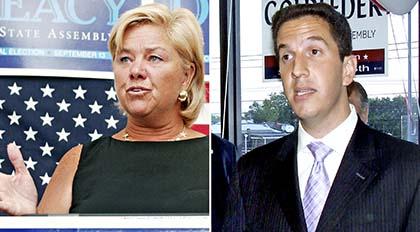By Joe Anuta
The two candidates vying for the 23rd Assembly District seat have raised vastly different amounts of money in the short period before the September special election.
Philip Goldfeder, a Democrat, has amassed more than three times the amount of campaign donations for the state seat compared to Republican Jane Deacy, according to records from the state Board of Elections.
As of Tuesday afternoon unions, businesses, other politicians and individuals all contributed to Goldfeder’s total donations of $163,685. He spent $49,839.97, which left him with $113,845.03 cash on hand.
Similar donor groups contributed to Deacy’s total contributions of $53,325. She had spent $19,412.48, according to the board, which left her with $33,912.52 as of Tuesday afternoon.
The majority of Deacy’s donors were from Queens, while most of Goldfeder’s were from outside of the district, with a large quantity coming from Brooklyn.
“I’m proud to have supporters all over the city and have supporters in the district,” Goldfeder said in a telephone interview.
That money pales in comparison to other campaign war chests, which run into the millions. But the amount of money the candidates could have raised was limited by the short run-up to the special election Sept. 13.
Gov. Andrew Cuomo announced the special election July 1. That left two months for the Republican and Democratic parties to officially give the nod to Deacy and Goldfeder, and for the candidates to raise money and campaign.
That short campaign period means money is extremely important, according to Evan Stavisky, a political consultant for Parkside Group, a Manhattan-based political consulting company that is currently working on the campaign for Assemblyman David Weprin (D-Little Neck).
“The old adage that ‘money is the mother’s milk of all politics’ is even more true in special elections,” he said.
Because of the short time period for campaigning, each moment spent raising funds is a moment lost talking to voters, Stavisky said.
Much of the money will likely be spent on direct mailings, which are the most effective form of communication, according to Stavisky, since other modes of communication like television are far too expensive.
But according to other political sources, the discrepancy in funding will not prove to be a large handicap for Deacy.
Both candidates are expected to make heavy use of direct mailings, and Deacy should still be able to send out a significant amount.
Goldfeder said he is focusing on getting out into the community and meeting potential constituents in person.
“A short campaign definitely presents a challenge,” he said. “Money doesn’t win the election. It’s the ability to talk to as many voters as possible.”
Michael Coppotelli, campaign manager for Deacy, also said that talking to voters is the most important way for her to get the word out.
“It’s the message that counts,” he said. “Every day — morning, noon and night — her schedule is full from the moment she wakes up until the moment she lays her head on the pillow.”
But even day-to-day operations on the campaign trail are not cheap, Stavisky said.
“You have a vision for why you are the best person for office and you need to talk to 100,000 people about it,” he said. “It is an expensive undertaking.”
The candidates also need to pay staff and buy literature, posters and other means of communicating their messages to the public, Stavisky said.
Reach reporter Joe Anuta by email at januta@cnglocal.com or by phone at 718-260-4566.



































